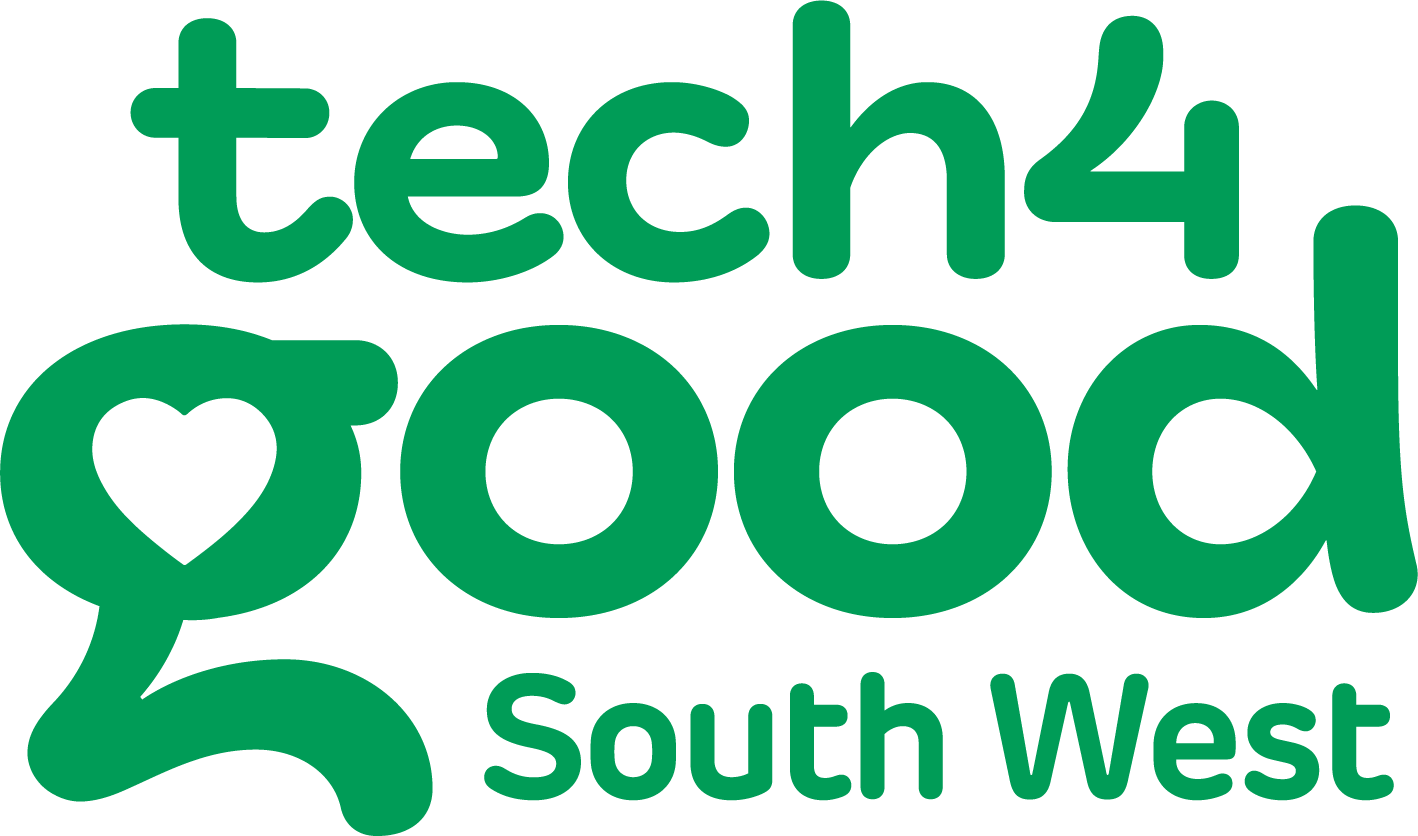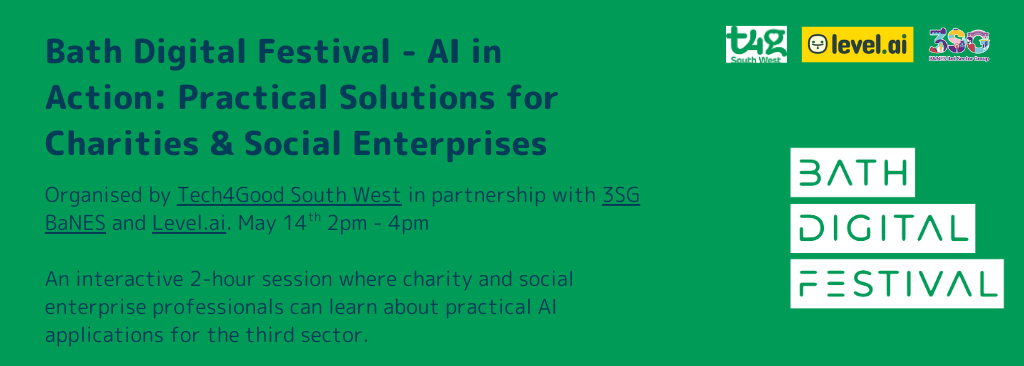AI in Action at Bath Digital Festival - Making AI Work for the Third Sector: A Peer-Led Approach
14/05/2025
At Tech4Good South West, we believe that if AI is going to support people and communities, it needs to be safe, ethical, and grounded in real needs. That means creating spaces where organisations can explore AI in a supportive environment. Where we can talk openly about data privacy, bias, and human oversight. And where tools are tested not in theory, but in practice.
That’s what we created at Bath Digital Festival on 14th May 2025.
Together with 3SG (B&NES Third Sector Group) and Level.AI, we hosted our first in-person, hands-on session of the Voluntary, Community and Social Enterprise (VCSE) AI Peer Network. The event focused on giving charities and social enterprises time and space to try things out — in a way that feels safe, practical, and collaborative.
Why AI in Action?
Across the South West, VCSE organisations are exploring AI. But many face real challenges: lack of time, unclear benefits, concerns about ethics, or simply not knowing where to start. According to recent research published by Third Sector, 59% of small charities are not using AI at all and this was driven by lack of technical knowledge, not seeing the value of AI, lack of resources and concerns over privacy.
AI in Action sessions are designed to bring people together in safe, informal environments that allow for practical exploration of AI to:
Understand what AI tools can actually do
Learn from peers already experimenting
Explore practical, real-world applications
Discuss ethical issues like privacy, bias and safety
Build confidence through hands-on testing
Share resources and tools
We wanted people to leave not just informed, but inspired — and cautious in the right ways.
Real Stories from the Sector
We started the day with a panel discussion with 4 speakers. The discussion covered the needs of the sector and some practical examples of how AI is being used now and the problems it can solve.
Becky Brooks, Director at 3SG opened with an overview of how the third sector is responding to the AI moment. She highlighted both the sense of opportunity and the growing anxiety about ethics, capacity, and relevance. Becky emphasised that while some larger organisations are exploring AI with confidence, many local voluntary, community and social enterprises (VCSE) feel they don’t yet have the skills, time or support to engage meaningfully — making peer spaces like this important. Her contributions mirrored the recent research highlighted earlier.
Becky was joined by Jim Cranshaw, Simon Allen and Olivia Edgar, who covered some examples of how AI can be used for fundraising, developing Chatbots to support a cancer charity and an AI tool to automate form-filling
Laptops to hand, we then moved into a practical session to allow people to learn more about different tools and give them a go.
Jim Cranshaw – Grants.ai
Jim demonstrated how AI can cut the time and cost of writing grant applications. Grants.ai aims to help charities answer common funding questions once, then reuse that knowledge across multiple bids. By pulling in criteria from dozens of funders, the tool streamlines prospect research and simplifies case-for-support writing — potentially saving the sector hundreds of millions. It’s particularly geared toward smaller charities, levelling the playing field in what can be a time-consuming and complex process.Olivia Edgar – Form Fighter
Olivia shared how Form Fighter is using AI to reduce the burden of form-filling for both staff and service users. The tool helps automate repetitive admin — such as data entry into funding forms or referral documents — and supports users who might otherwise find these processes inaccessible.Simon Allen – Level.AI and CEO Age UK BaNES
Simon walked through how his team is building a safe, AI-powered chatbot to help triage enquiries to a clinical advice line. With contact volumes increasing and questions becoming more complex, the chatbot aims to reduce pressure on staff by handling simpler queries — pulling from a trusted bank of pre-approved documents. Crucially, the system is designed with guardrails: it doesn’t offer clinical advice, it always signposts to a human, and it’s focused on enhancing access rather than replacing human care.Bronwyn Kundhardt – Polecat / 42London
Bronwyn led a demo showing how to build custom AI assistants using Claude Projects and ChatGPT. She made the process feel accessible and achievable, walking through how organisations can use existing materials like reports, surveys, and internal guides to train their own private, secure AI assistants.
What People Took Away
To close the session, we asked everyone to jot down one or two things they planned to do next. Here’s what came through:
Personally, participants said they would:
Connect with others in the network and continue learning
Experiment with tools like Claude, ChatGPT, Form Fighter and Grants.ai
Learn more about writing good prompts
Start internal conversations about where AI might help
Explore how AI could support neurodivergent users and improve accessibility
At an organisational level, people planned to:
Begin drafting or updating AI strategies and policies
Use AI to streamline admin and reduce team workload
Test AI to support fundraising and service delivery
Consider the ethical implications of introducing AI tools
Explore more secure and inclusive digital systems
What the Sector Asked of Us
We also asked participants what they’d like next from the VCSE AI Peer Network and Tech4Good South West. The most common requests were:
More local, practical sessions
Clearer, simpler guidance for beginners
Real-world case studies from small charities
Recommendations for low-cost, inclusive tools
Ongoing ways to stay connected and share progress
This list of requests is exactly what we are creating across the Tech4Good network and in particular through the AI Peer Network and across much of our work, including Digital Trustees Network in partnership with Third Sector Labs (supporting the growth of digital skills on Boards) and our Skills for Good Pilot in partnership with Aviva (supporting skilled volunteering between the tech sector and VCSE sectors).
What’s Next?
The VCSE AI Peer Network is growing around the needs of its members. Based on what we heard at Bath, we’re planning:
More beginner-friendly events
Sessions focused on ethical, safe, and inclusive AI
Developing an AI Living Lab for charities and social enterprises. This year's focus will be on supporting organisation to develop their own custom assistants. A custom assistant is a digital tool you can train to answer questions, use your content, and reflect the tone and approach of your work.
Practical tools and frameworks for responsible use
Our next online session takes place on Monday 23 June, 12:00–1:30pm. Whether you're exploring a tool, drafting a policy, or just curious where to start — come along. It is FREE for Tech4Good South West Members or £15 per session for non-members. (Membership starts at £45 per annum)
Sign up here - https://tickets.mp/ZXZlbnQ6NzY1Ng==
Any questions, contact: hello@tech4goodsouthwest.org
Want to Try Something Today?
Here are some resources and guides we shared on the day:
AI Resource Hub (BETA) - Prototype
How to Create a Custom GPT (OpenAI)
OpenAI Help Guide
Watch: How to create a custom GPT | OpenAI
How to Use Claude Projects (Anthropic)
Claude Projects Help Guide
Watch: Claude Projects Full Guide


